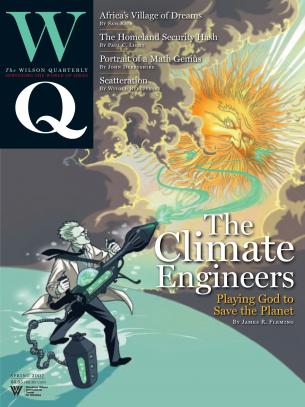The Climate Engineers


The outpouring of tens of billions to improve global health seems like the most hopeful event of the 21st century. But the largess could make things worse.
A Navy chaplain's legal challenge has focused a spotlight on the military's rules regarding religious worship.
The curious history of a famous photo from the Hungarian Revolution, and what the people in the picture came to symbolize.
A closer look at a doctoral dissertation that became the basis for a notorious British policy paper justifying involvement in the Iraq war.
Reports of conservatism's demise may be greatly exaggerated.
Modern political science is heavy on exotic statistical analysis and narrow specialization, short on practical insights into democratic governance.
Nowadays, overwork has become a badge of honor.
Despite changes in work hours, leisure time has not changed at all in the last century.
In the struggle to improve America's schools, teachers' unions are often a strong voice against misguided policies.
More than half the world's population now lives in cities, and the signs of strain are becoming more noticeable.
Arguments over Barack Obama's "blackness" are only one indication of changing racial attitudes in America.
By 2025, a date less distant than the span of Pope John Paul II’s reign, the largest group of the world’s 2.6 billion Christians will be living in Latin America.
The appearance of giraffes sparked different--and very revealing--reactions in Europe and China.
Historians now think the Amazon was once the site of an ancient civilization that flourished before the conquistadors arrived.
Digital fingerprints are spawning new security enhancements, and allowing both marketers and law enforcement agencies to track online identities.
Constellations are among humankind’s earliest creations and can be more revealing in some ways than the pottery and tools unearthed by archaeologists.
Amid the gold-rush atmosphere of the current art world, a strange philosophy has emerged: laissez-faire aesthetics.
Evidence seems strong that Edouard Manet used photographic prints and lighting to make some of his best-known paintings, but, says a critic, for him "photography seems to have motivated, and even abetted, a kind of counter-photographic style.”
Many scholars point out that Chinese hegemony is far from assured, and that in its climb to power and wealth China has disappointed new friends and attracted unsavory allies.
Fifteen years of freedom have transformed the language of Ukraine just as they have changed the nation.
More than 30 years after the end of the Vietnam War, the most heavily bombed regions seem to be slightly better off than similar villages throughout Vietnam that escaped the explosives.
Wendy Kaminer on plagiarism
Andrew J. Bacevich on war in the modern world
Michael Kammen on public surveys
David J. Garrow on black teachers in the segregated South
James Conaway on Thomas Jefferson, the oenophile
Sarah L. Courteau on the social history of swimming pools
Angela Balcita on growing up Japanese in the American heartland
Christopher Merrill on China's Nobel Prize-winning author
Nicholas Hengen on lyric poetry
Stephen Miller on the history of Sunday
Amy E. Schwartz on Jewish mothers
Gordon Grice on ants
Evelin Sullivan on lie detectors
J. Peter Pham on child soldiers
The next big debate in the global warming arena is going to be about climate engineering. But efforts to manipulate the climate and weather have a long history of exaggerated claims and beliefs, and a dangerous tendency to become militarized. Even if they succeed, who will control the global thermostat?
A small Kenyan village is the laboratory for celebrity economist Jeffrey Sachs’s ambitious scheme to lift Africa out of poverty. Can big money buy the continent’s poorest people a better future?
Leonhard Euler is seldom remembered as one of the Enlightenment greats, but he should be. His discoveries changed the course of mathematics forever, and 300 years after his birth his ideas continue to resonate in classrooms and laboratories.
Sprawl-bashing only obscures what's really going on in the American landscape—and what can be done to improve the quality of life.
The Department of Homeland Security gets little credit for the fact that terrorists have not staged an attack on American soil since 2001, and it is an open question whether it deserves much. Conceived in haste and crippled by its design, the newestaddition to the cabinet desperately needs an overhaul.